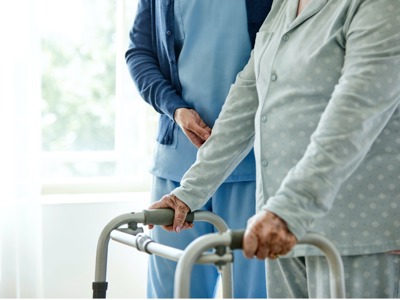
‘Pandemic exposed existing issues in healthcare’: closing submissions made to Module 3 of the UK Covid-19 Inquiry
John’s Campaign, Care Rights UK and the Patients Association have called for a new right in law to a Care Supporter for people across all health and care settings.
Posted on 28 November 2024
They made the call after evidence was heard at the Covid Inquiry regarding the exclusion of carers and visitors from healthcare settings during the pandemic.
In closing submissions made to Module 3 of the inquiry on Wednesday 27 November, the three organisations also voiced their concern over the extent to which the pandemic pressure “exposed the lack of capacity within the healthcare system”.
The groups say it meant that people’s treatments were suspended or not offered because they were old, disabled, or lived in a care home.
Over the past 10 weeks the inquiry has reviewed the governmental and societal response to Covid-19 as well as the impact the pandemic had on healthcare systems, patients and healthcare workers.
The three organisations, who are Core Participants in the healthcare module of the inquiry chaired by Baroness Hallett, are aiming to ensure the voices of people needing healthcare, their loved ones and carers are fully heard.
The group were in direct contact with patients and carers through the pandemic period. They shared “harrowing tales” with the inquiry as well as survey evidence of the damage done and the need for future change.
The three organisations who carefully followed the 10-week hearing found that the evidence showed that:
- Do not attempt cardiopulmonary resuscitation (DNACPR) notices: Evidence underscored the inappropriateness of blanket DNACPR notices issued without proper consultation or individualised assessments. The group emphasised the NHS's duty to provide equitable treatment to all, regardless of age, disability, or residence.
- Virtual consultations and NHS 111: While virtual consultations increased access for some, they excluded digitally disadvantaged groups and individuals with additional needs. Reliance on NHS 111 also often fell short for vulnerable people, revealing ongoing gaps in accessibility.
- Exclusion of carers and visitors: This policy, while intended to curb infection, often led to devastating outcomes for patients, particularly those with cognitive impairments or communication difficulties. The Core Participants shared accounts of patients being isolated during critical moments, from childbirth to end-of-life care.
- The role of unpaid carers: The pandemic saw millions of individuals stepping in as unpaid carers due to service gaps. This unrecognised labour underscored the need for greater support and inclusion of family carers as part of patients’ healthcare teams.
The group’s submissions concluded with calls for recommendations from the inquiry, including:
- A legislative right to a Care Supporter across health and care settings.
- Strengthening feedback and complaints systems to ensure patients and families can raise concerns and have their voices heard.
- Embedding statutory obligations such as the obligations under the Equality and Human Rights Act into healthcare planning and decision-making, even in emergencies.
- Training healthcare workers in legal and ethical principles to safeguard patient rights.
Leigh Day human rights partner Emma Jones who together with Carolin Ott represents the Core Participant group said:
“The evidence presented in Module 3 has been both moving and deeply troubling. It has shown us the human cost of decisions made without sufficient regard for patients' rights, individual needs, and the vital role of families and carers. As public bodies reflect on this module, our clients ask them to commit to building a healthcare system that prioritises dignity, person-centred care, and the centrality of human relationships - even in the most challenging circumstances.”




